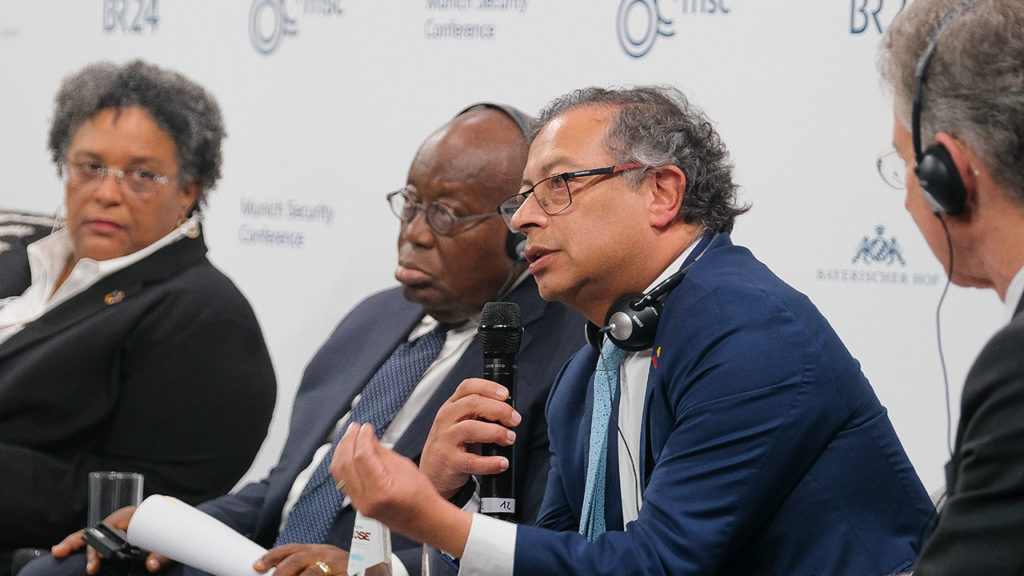
Colombian President Gustavo Petro participated in the Munich Security Conference (MSC), Germany, on February 16-17. Petro was the only South American president invited to this important event that seeks solutions to world peace. In his speech, the Colombian president called for the transformation of global democratic power and defended the construction of social justice as a model to avoid armed conflicts.
“There is another possible way out of the death and barbarism of the ongoing wars,” said the Colombian president at the MSC, and that is “a democratic global public power that means a change in power relations”.
Subsequently, Gustavo Petro held a meeting with the German Federal Chancellor, Olaf Scholz, and with the European Union’s High Representative for Foreign Affairs, Josep Borrell. In both meetings, which were brief, peace issues with the European Union and Germany were the main topics discussed, in addition to the production of green hydrogen.
The alternative to pumps
In the communiqué issued by the Presidency, it can be read that “the objective of the Conference is to build trust and contribute to the peaceful resolution of conflicts, hence its interest in promoting dialogue where it would otherwise not be possible, allowing informal exchanges between decision-makers”.
In this sense, Gustavo Petro affirmed in his speech that his government is working towards reconciliation in Colombia based on “building social justice”, something that he pointed out can be projected on a planetary scale. The Colombian head of state asserted that “if we want to maintain the same power relations as today, that means brute force, measured in the number of airplanes and bombs. If we really want to survive as humanity, that means the number of votes. Today, humanity has voted in the United Nations for the end of wars”.
In the debate “A global order that works for all”, President Petro affirmed that the word “crisis” gives the impression that “there is a comprehensive collapse, and that means that a paradigm has come to an end”. That paradigm, explained the Colombian leader, is “how we have governed in the last 40 years, expecting the market to take us to a maximum of welfare. The reality today is that we are on the verge of extinction”.
In subsequent statements to the press, Gustavo Petro repeated that “the territory linked to the illicit economy is the cradle of today’s violence”, and called for “replacing illicit economies, cocaine, gold, with licit and prosperous economies”. He added that this transition could be helped by developed countries providing an export market for new products in the first few years, in order to favor the development of legal economies.
Criticism of the economic system
Petro warned about the perception that progress has come to an end, comparing it to the global barbarism of 1933. He warned about the feeling of being impotent spectators or accomplices of a “genocide in real time“. For him, this situation marks the beginning of a crisis that is hitting the countries of the South in particular.
He explained that the South is forced to expel its population due to the migration of resources such as water to the North and the acceleration of the melting of ice. Petro stressed the seriousness of this reality and the need for action. His speech emphasized the shared responsibility and urgency of addressing these global problems that threaten to trigger a humanitarian crisis of catastrophic proportions.
The Colombian president suggested the feasibility of a democratic agreement between Africa and South America, highlighting their potential in renewable energies. He counterposed this vision to the conventional conception of oil as booty, advocating a new paradigm that integrates global and democratic public power.
In his conclusion, he emphasized the urgent need to transform power relations, moving away from the measure of force represented by airplanes and bombs, to ensure the survival of humanity. His speech called for regional and global cooperation based on equity and sustainability, seeking solutions that transcend traditional structures and promote a more inclusive and just approach.
Meetings with Scholz and Borrell
On Saturday, February 17, the Colombian President held brief meetings with European representatives: the German Chancellor, Olaf Sholz, and the European Union’s High Representative for Foreign Affairs, Josep Borrell.
During both meetings, peace issues were highlighted, given the special involvement of the European Union and Germany in the monitoring of the 2016 agreement and the Total Peace policy, which is being developed by the Colombian government. These efforts are focused on the dialogues with three guerrilla groups, the National Liberation Army (ELN) and the two main dissidents of the extinct FARC-EP.
In addition, the meeting with Chancellor Scholz addressed the production of green hydrogen, a field in which Germany stands out for its leadership in clean energy technologies. The ambassador to the European Union, Jorge Rojas, highlighted in conversations with Colombian newspaper El Tiempo the interest of several European countries in Colombia due to the favorable conditions for the production of green hydrogen in the country.
These dialogues and partnerships reflect the importance of addressing both peace agendas and opportunities in the field of sustainable energy to build strong international relations and foster economic and social development in Colombia and the region.
See all the latest news from Colombia and the world at ColombiaOne.com. Contact our newsroom to report an update or send your story, photos and videos. Follow Colombia One on Google News, Facebook, Instagram, and subscribe here to our newsletter.

